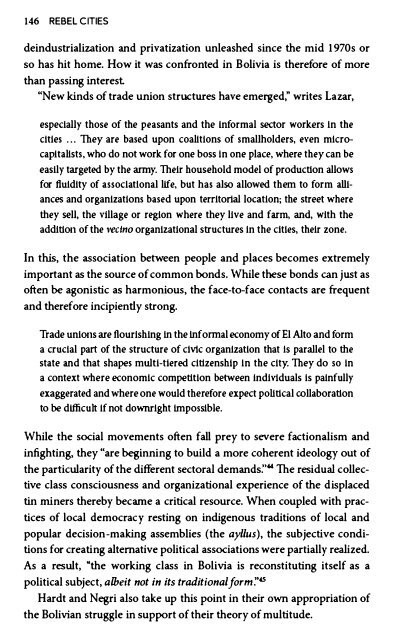Rebel Cities-David Harvey
Rebel Cities-David Harvey
Rebel Cities-David Harvey
- No tags were found...
Create successful ePaper yourself
Turn your PDF publications into a flip-book with our unique Google optimized e-Paper software.
146 REBEL CITIESdeindustrialization and privatization unleashed since the mid 1970s orso has hit home. How it was confronted in Bolivia is therefore of morethan passing interest"New kinds of trade union structures have emerged," writes Lazar,especially those of the peasants and the Informal sector workers In thecities ... They are based upon coalitions of smallholders, eYen microcapitalists, who do not work for one boss In one place, where they can beeasily targeted by the army. Their household model of production allowsfor fluidity of assoclatlonal llfe, but has also allowed them to form alliancesand organizations based upon territorial location; the street wherethey sell, the Yillage or region where they live and farm, and, with theaddition of the wclno organizational structures In the cities, their zone.In this, the association between people and places becomes extremelyimportant as the source of common bonds. While these bonds can just asoften be agonistic as harmonious, the face-to-face contacts are frequentand therefore incipiently strong.Trade unions are flourishing In the lnfonnal economy of El Alto and fo rma crucial part of the structure of civic organization that Is parallel to thestate and that shapes multi-tiered citizenship In the city. They do so Ina context where economic competition between lndiYiduals Is painfullyexaggerated and where one would therefore expect political collaborationto be dlfficuh If not downright Impossible.While the social movements often fall prey to severe factionalism andinfighting, they "are beginning to build a more coherent ideology out ofthe particularity of the different sectoral demands:'" The residual collectiveclass consciousness and organizational experience of the displacedtin miners thereby became a critical resource. When coupled with practicesof local democracy resting on indigenous traditions of local andpopular decision-making assemblies (the ayllus), the subjective conditionsfor creating alternative political associations were partially realized.As a result, "the working class in Bolivia is reconstituting itself as apolitical subject, albeit not in its traditional form:'45Hardt and Negri also take up this point in their own appropriation ofthe Bolivian struggle in support of their theory of multitude.


